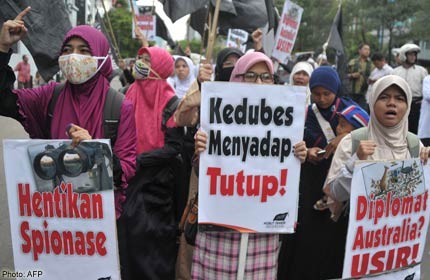Spying row gives Indonesia upper hand over Australia

After a week of escalating tensions, an end to the spying row between Jakarta and Canberra appears to be in sight.
On Tuesday, Indonesian President Susilo Bambang Yudhoyono said he welcomed Australian Prime Minister Tony Abbott's response to his letter seeking a code of ethics on future intelligence and military exchanges. Mr Abbott, he said, had agreed to his proposal.
The news, coming eight days after disclosures that Australia had wiretapped the mobile phones of Dr Yudhoyono, his wife and Indonesian leaders, has made President appear firm, yet reasonable.
But the jury is still out on whether his handling of the matter will, as some have suggested, boost his approval ratings, let alone that of his battered Democrat Party.
What the events have highlighted is that the leaks from former US intelligence contractor Edward Snowden, and Dr Yudhoyono's response, may have given Indonesia the upper hand as it seeks to redraw its security relationship with Australia.
"Australia's readiness to work together on a code of conduct is good for public perception towards SBY (Dr Yudhoyono)," Mr Bawono Kumoro of The Habibie Centre told The Straits Times.
"But what was unsaid was whether there was an apology from Prime Minister Tony Abbott, and the public was hoping for that."
To recap: When the disclosures broke on Monday last week, Indonesia recalled its ambassador to Australia the same day.
Dr Yudhoyono suspended all security exchanges with Canberra on Wednesday, firing off his letter on intelligence and the military to Mr Abbott. Over the next two days, protesters demonstrated outside the heavily guarded Australian Embassy in Jakarta.
By Saturday, Dr Yudhoyono had received Mr Abbott's reply in Bali, where he was on a working trip.
This Tuesday, he met key Cabinet ministers to discuss a response, which he then announced to the media, without giving details of Mr Abbott's remarks.
Significantly, Dr Yudhoyono spelt out a six-step process concerning the new code of ethics before Indonesia would resume full military, police and intelligence cooperation with its southern neighbour.
The Indonesian President, in dictating these terms, made it clear that Australia had been in the wrong, and that the responsible thing for it to do was to play along.
As the Sydney Morning Herald put it: "SBY has made it clear that we won't enjoy that cooperation until after a new intelligence gathering 'code of ethics' has been negotiated, signed, implemented and tested."
Mr Abbott, the newspaper said, "now finds the Indonesian President saying: 'I don't trust you to negotiate in good faith, so I'll hold a big stick over you until after we're finished'."
Some of the Indonesian press interpreted it in a similar way.
Republika daily's headline said: "Indonesia not yet satisfied with Australian PM's reply" while Quran Tempo's read: "Abbott's letter not an apology".
However, Australia's quick coming to terms with the need to make amends - weighted, it seems, in Jakarta's favour - has highlighted how Indonesia has become a country that cannot be trifled with.
What the heated commentaries in Indonesian newspapers omitted was that this strength was due in part to the political stability and economic growth under the Yudhoyono administration.
This stability enabled Indonesia to negotiate the Lombok Treaty with Australia in 2006 that provided for wide-ranging cooperation in security matters, including fighting cross-border crimes.
"Australia sees Indonesia's rising importance in the current strategic environment..." said Indonesian Defence University professor Bantarto Bandoro. "Indonesia is just too important for Australia to ignore."
Ironically, it was this importance that made Australia's spies want to listen in on the conversations of Dr Yudhyono's inner circle, chatter that would presumably be barred under the new code.
But even with the thaw, some 500 demonstrators yesterday protested at the Australian war memorial in Balikpapan, East Kalimantan, to demand that Mr Abbott apologise.
For some, the absence of a clear apology is a sign that Dr Yudhoyono has not been tough enough.
zakirh@sph.com.sg

Get a copy of The Straits Times or go to straitstimes.com for more stories.